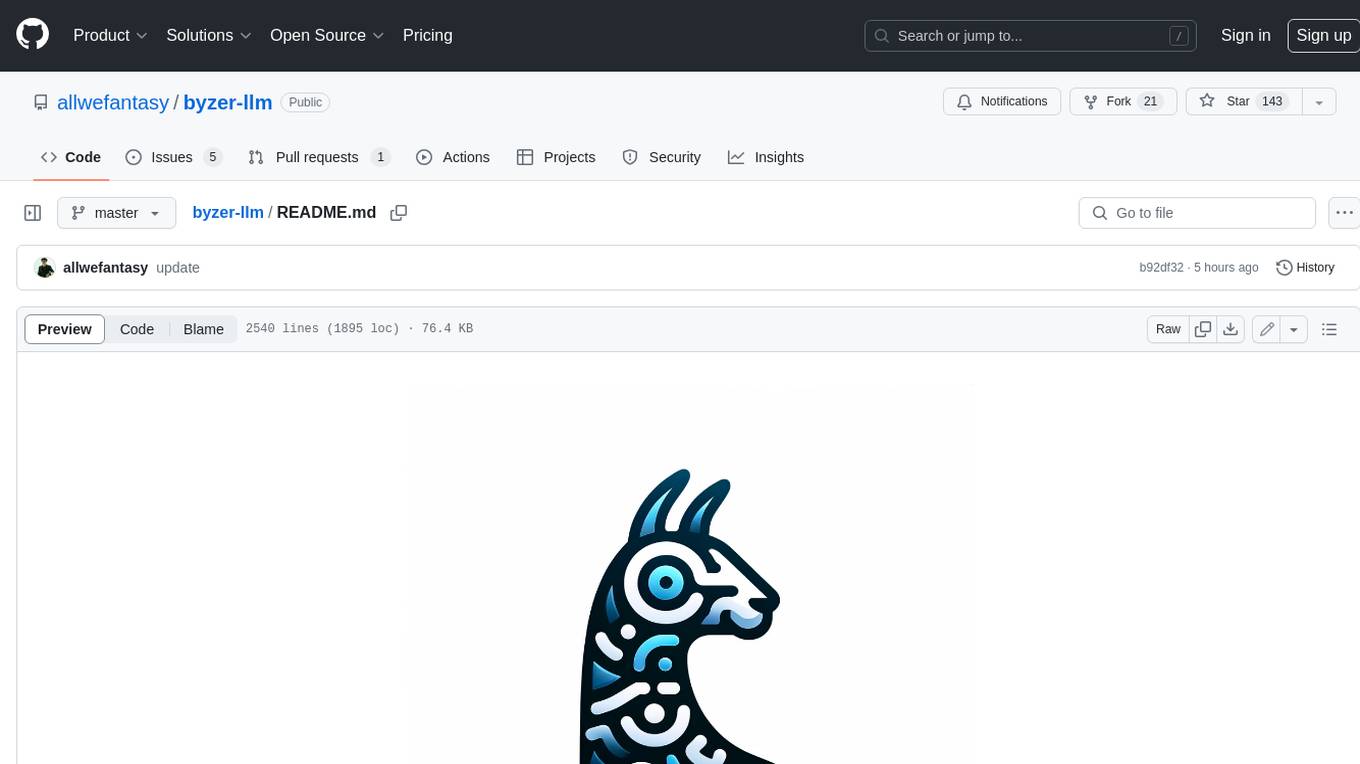
langchain-rust
🦜️🔗LangChain for Rust, the easiest way to write LLM-based programs in Rust
Stars: 722
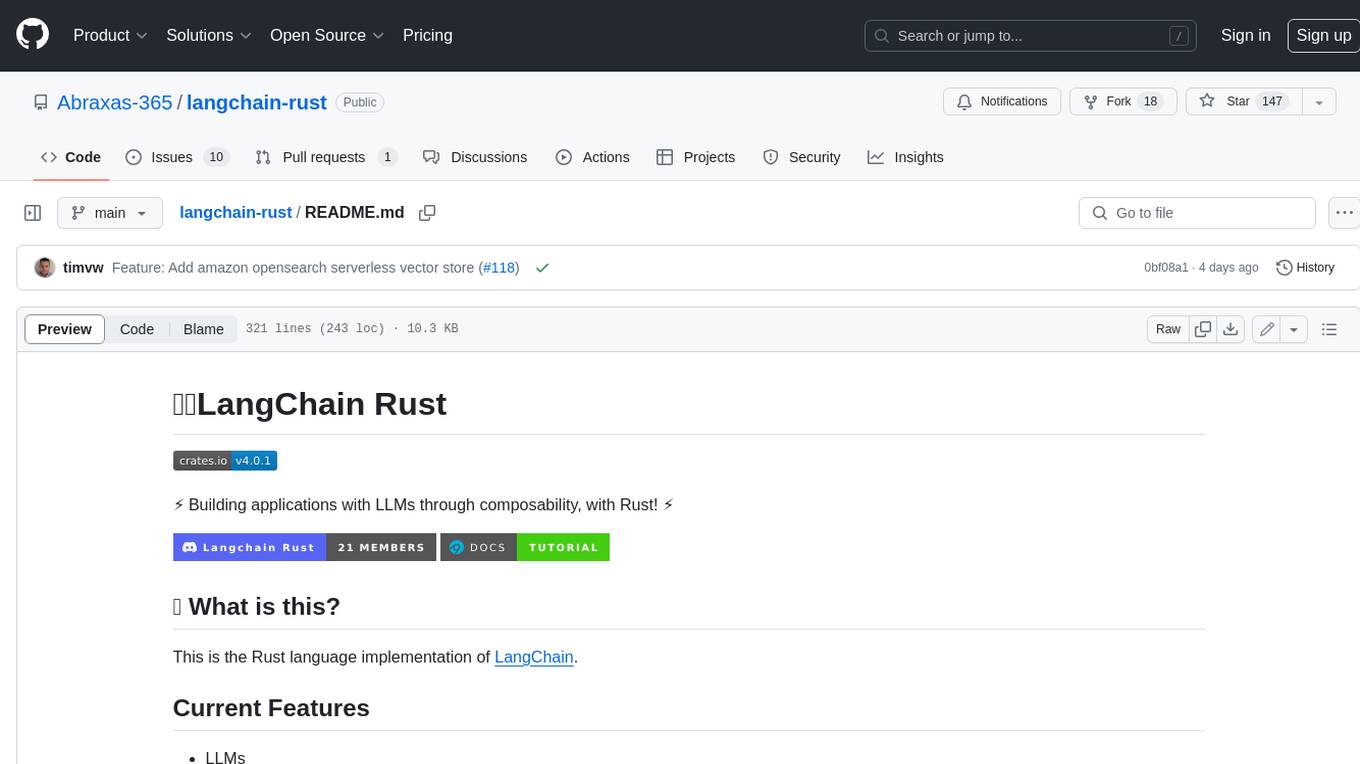
LangChain Rust is a library for building applications with Large Language Models (LLMs) through composability. It provides a set of tools and components that can be used to create conversational agents, document loaders, and other applications that leverage LLMs. LangChain Rust supports a variety of LLMs, including OpenAI, Azure OpenAI, Ollama, and Anthropic Claude. It also supports a variety of embeddings, vector stores, and document loaders. LangChain Rust is designed to be easy to use and extensible, making it a great choice for developers who want to build applications with LLMs.
README:
⚡ Building applications with LLMs through composability, with Rust! ⚡
This is the Rust language implementation of LangChain.
-
LLMs
- [x] OpenAi
- [x] Azure OpenAi
- [x] Ollama
- [x] Anthropic Claude
-
Embeddings
- [x] OpenAi
- [x] Azure OpenAi
- [x] Ollama
- [x] Local FastEmbed
- [x] MistralAI
-
VectorStores
- [x] OpenSearch
- [x] Postgres
- [x] Qdrant
- [x] Sqlite
- [x] SurrealDB
-
Chain
- [x] LLM Chain
- [x] Conversational Chain
- [x] Conversational Retriever Simple
- [x] Conversational Retriever With Vector Store
- [x] Sequential Chain
- [x] Q&A Chain
- [x] SQL Chain
-
Agents
-
Tools
- [x] Serpapi/Google
- [x] DuckDuckGo Search
- [x] Wolfram/Math
- [x] Command line
- [x] Text2Speech
-
Semantic Routing
- [x] Static Routing
- [x] Dynamic Routing
-
Document Loaders
-
[x] PDF
use futures_util::StreamExt; async fn main() { let path = "./src/document_loaders/test_data/sample.pdf"; let loader = PdfExtractLoader::from_path(path).expect("Failed to create PdfExtractLoader"); // let loader = LoPdfLoader::from_path(path).expect("Failed to create LoPdfLoader"); let docs = loader .load() .await .unwrap() .map(|d| d.unwrap()) .collect::<Vec<_>>() .await; }
-
[x] Pandoc
use futures_util::StreamExt; async fn main() { let path = "./src/document_loaders/test_data/sample.docx"; let loader = PandocLoader::from_path(InputFormat::Docx.to_string(), path) .await .expect("Failed to create PandocLoader"); let docs = loader .load() .await .unwrap() .map(|d| d.unwrap()) .collect::<Vec<_>>() .await; }
-
[x] HTML
use futures_util::StreamExt; use url::Url; async fn main() { let path = "./src/document_loaders/test_data/example.html"; let html_loader = HtmlLoader::from_path(path, Url::parse("https://example.com/").unwrap()) .expect("Failed to create html loader"); let documents = html_loader .load() .await .unwrap() .map(|x| x.unwrap()) .collect::<Vec<_>>() .await; }
-
[x] HTML To Markdown
use futures_util::StreamExt; use url::Url; async fn main() { let path = "./src/document_loaders/test_data/example.html"; let html_to_markdown_loader = HtmlToMarkdownLoader::from_path(path, Url::parse("https://example.com/").unwrap(), HtmlToMarkdownOptions::default().with_skip_tags(vec!["figure".to_string()])) .expect("Failed to create html to markdown loader"); let documents = html_to_markdown_loader .load() .await .unwrap() .map(|x| x.unwrap()) .collect::<Vec<_>>() .await; }
-
[x] CSV
use futures_util::StreamExt; async fn main() { let path = "./src/document_loaders/test_data/test.csv"; let columns = vec![ "name".to_string(), "age".to_string(), "city".to_string(), "country".to_string(), ]; let csv_loader = CsvLoader::from_path(path, columns).expect("Failed to create csv loader"); let documents = csv_loader .load() .await .unwrap() .map(|x| x.unwrap()) .collect::<Vec<_>>() .await; }
-
[x] Git commits
use futures_util::StreamExt; async fn main() { let path = "/path/to/git/repo"; let git_commit_loader = GitCommitLoader::from_path(path).expect("Failed to create git commit loader"); let documents = csv_loader .load() .await .unwrap() .map(|x| x.unwrap()) .collect::<Vec<_>>() .await; }
-
[x] Source code
let loader_with_dir = SourceCodeLoader::from_path("./src/document_loaders/test_data".to_string()) .with_dir_loader_options(DirLoaderOptions { glob: None, suffixes: Some(vec!["rs".to_string()]), exclude: None, }); let stream = loader_with_dir.load().await.unwrap(); let documents = stream.map(|x| x.unwrap()).collect::<Vec<_>>().await;
-
This library heavily relies on serde_json for its operation.
First, ensure serde_json is added to your Rust project.
cargo add serde_jsonThen, you can add langchain-rust to your Rust project.
cargo add langchain-rustDownload additional sqlite_vss libraries from https://github.com/asg017/sqlite-vss
cargo add langchain-rust --features sqlite-vssDownload additional sqlite_vec libraries from https://github.com/asg017/sqlite-vec
cargo add langchain-rust --features sqlite-veccargo add langchain-rust --features postgrescargo add langchain-rust --features surrealdbcargo add langchain-rust --features qdrantPlease remember to replace the feature flags sqlite, postgres or surrealdb based on your
specific use case.
This will add both serde_json and langchain-rust as dependencies in your Cargo.toml
file. Now, when you build your project, both dependencies will be fetched and compiled, and will be available for use in your project.
Remember, serde_json is a necessary dependencies, and sqlite, postgres and surrealdb
are optional features that may be added according to project needs.
use langchain_rust::{
chain::{Chain, LLMChainBuilder},
fmt_message, fmt_placeholder, fmt_template,
language_models::llm::LLM,
llm::openai::{OpenAI, OpenAIModel},
message_formatter,
prompt::HumanMessagePromptTemplate,
prompt_args,
schemas::messages::Message,
template_fstring,
};
#[tokio::main]
async fn main() {
//We can then initialize the model:
// If you'd prefer not to set an environment variable you can pass the key in directly via the `openai_api_key` named parameter when initiating the OpenAI LLM class:
// let open_ai = OpenAI::default()
// .with_config(
// OpenAIConfig::default()
// .with_api_key("<your_key>"),
// ).with_model(OpenAIModel::Gpt4oMini.to_string());
let open_ai = OpenAI::default().with_model(OpenAIModel::Gpt4oMini.to_string());
//Once you've installed and initialized the LLM of your choice, we can try using it! Let's ask it what LangSmith is - this is something that wasn't present in the training data so it shouldn't have a very good response.
let resp = open_ai.invoke("What is rust").await.unwrap();
println!("{}", resp);
// We can also guide it's response with a prompt template. Prompt templates are used to convert raw user input to a better input to the LLM.
let prompt = message_formatter![
fmt_message!(Message::new_system_message(
"You are world class technical documentation writer."
)),
fmt_template!(HumanMessagePromptTemplate::new(template_fstring!(
"{input}", "input"
)))
];
//We can now combine these into a simple LLM chain:
let chain = LLMChainBuilder::new()
.prompt(prompt)
.llm(open_ai.clone())
.build()
.unwrap();
//We can now invoke it and ask the same question. It still won't know the answer, but it should respond in a more proper tone for a technical writer!
match chain
.invoke(prompt_args! {
"input" => "Quien es el escritor de 20000 millas de viaje submarino",
})
.await
{
Ok(result) => {
println!("Result: {:?}", result);
}
Err(e) => panic!("Error invoking LLMChain: {:?}", e),
}
//If you want to prompt to have a list of messages you could use the `fmt_placeholder` macro
let prompt = message_formatter![
fmt_message!(Message::new_system_message(
"You are world class technical documentation writer."
)),
fmt_placeholder!("history"),
fmt_template!(HumanMessagePromptTemplate::new(template_fstring!(
"{input}", "input"
))),
];
let chain = LLMChainBuilder::new()
.prompt(prompt)
.llm(open_ai)
.build()
.unwrap();
match chain
.invoke(prompt_args! {
"input" => "Who is the writer of 20,000 Leagues Under the Sea, and what is my name?",
"history" => vec![
Message::new_human_message("My name is: luis"),
Message::new_ai_message("Hi luis"),
],
})
.await
{
Ok(result) => {
println!("Result: {:?}", result);
}
Err(e) => panic!("Error invoking LLMChain: {:?}", e),
}
}For Tasks:
Click tags to check more tools for each tasksFor Jobs:
Alternative AI tools for langchain-rust
Similar Open Source Tools

langchain-rust
LangChain Rust is a library for building applications with Large Language Models (LLMs) through composability. It provides a set of tools and components that can be used to create conversational agents, document loaders, and other applications that leverage LLMs. LangChain Rust supports a variety of LLMs, including OpenAI, Azure OpenAI, Ollama, and Anthropic Claude. It also supports a variety of embeddings, vector stores, and document loaders. LangChain Rust is designed to be easy to use and extensible, making it a great choice for developers who want to build applications with LLMs.
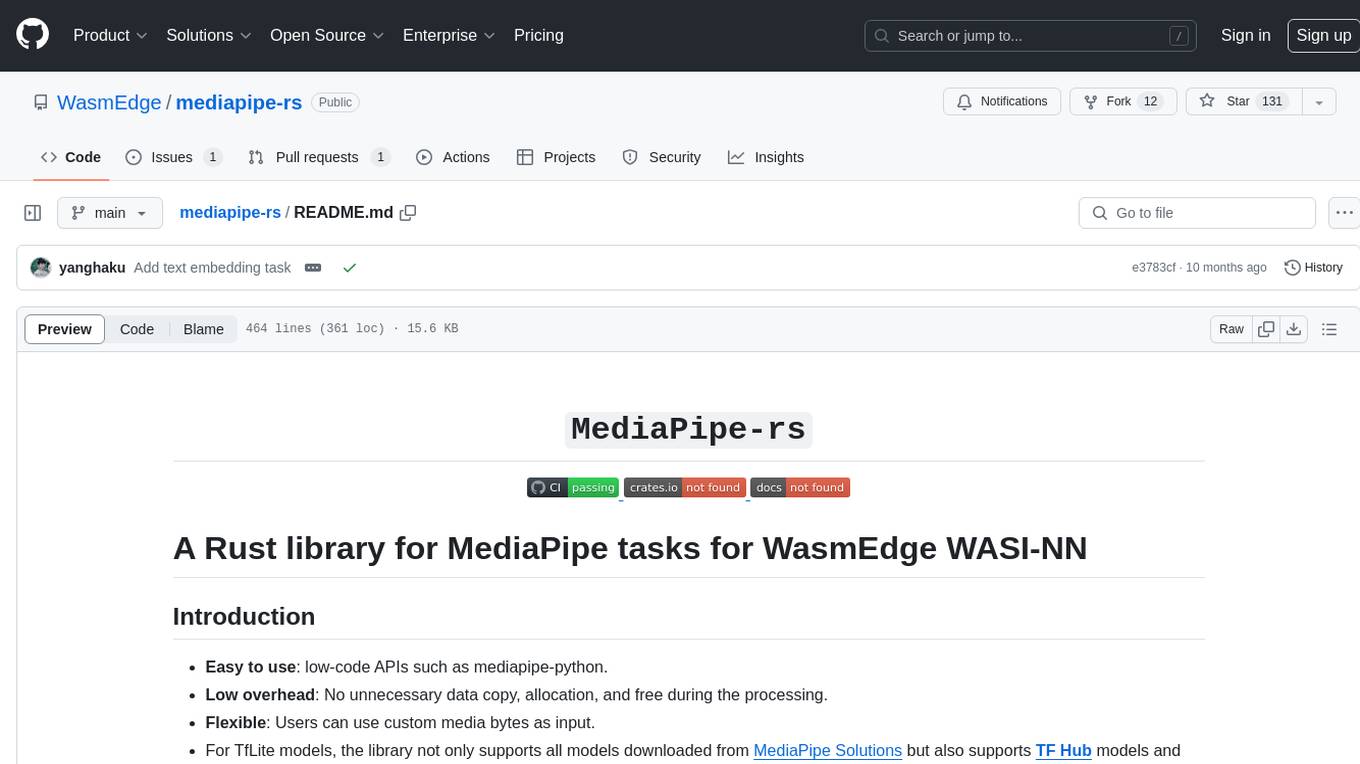
mediapipe-rs
MediaPipe-rs is a Rust library designed for MediaPipe tasks on WasmEdge WASI-NN. It offers easy-to-use low-code APIs similar to mediapipe-python, with low overhead and flexibility for custom media input. The library supports various tasks like object detection, image classification, gesture recognition, and more, including TfLite models, TF Hub models, and custom models. Users can create task instances, run sessions for pre-processing, inference, and post-processing, and speed up processing by reusing sessions. The library also provides support for audio tasks using audio data from symphonia, ffmpeg, or raw audio. Users can choose between CPU, GPU, or TPU devices for processing.
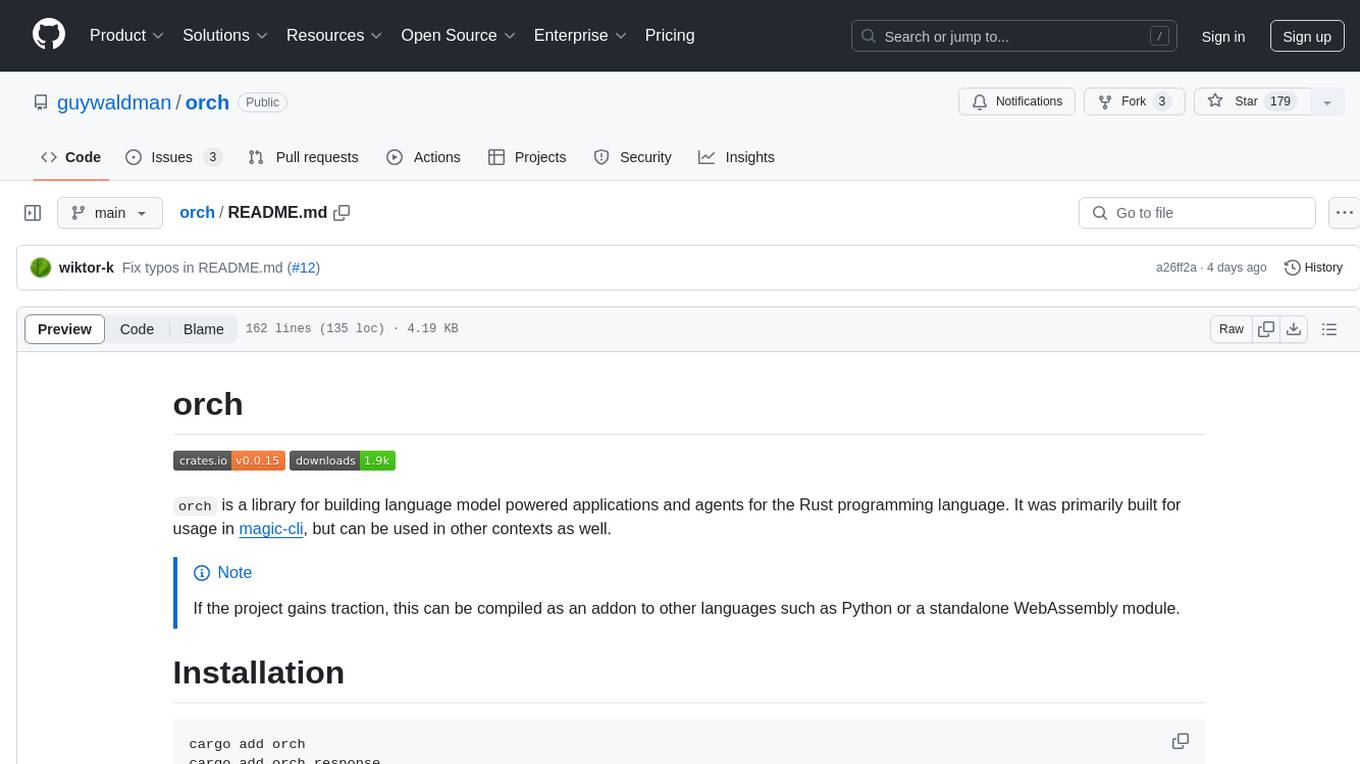
orch
orch is a library for building language model powered applications and agents for the Rust programming language. It can be used for tasks such as text generation, streaming text generation, structured data generation, and embedding generation. The library provides functionalities for executing various language model tasks and can be integrated into different applications and contexts. It offers flexibility for developers to create language model-powered features and applications in Rust.
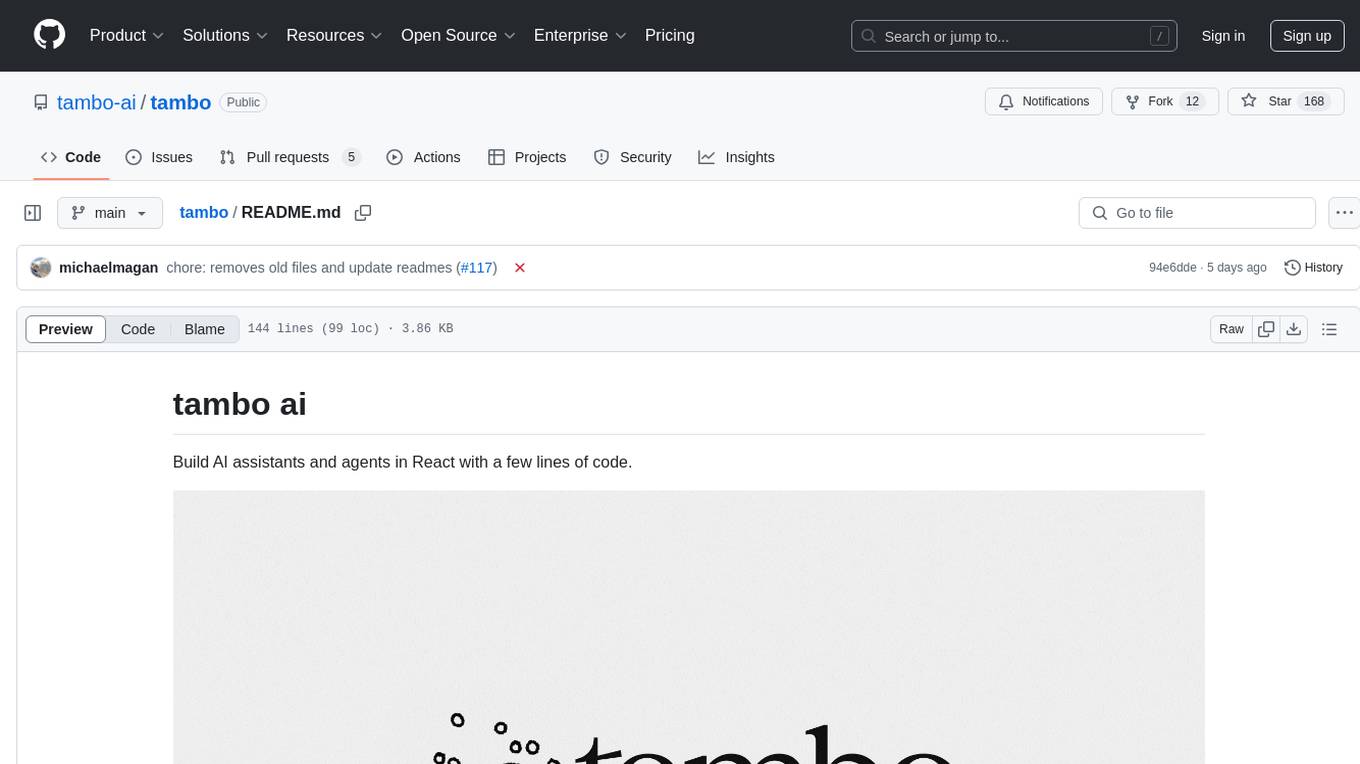
tambo
tambo ai is a React library that simplifies the process of building AI assistants and agents in React by handling thread management, state persistence, streaming responses, AI orchestration, and providing a compatible React UI library. It eliminates React boilerplate for AI features, allowing developers to focus on creating exceptional user experiences with clean React hooks that seamlessly integrate with their codebase.
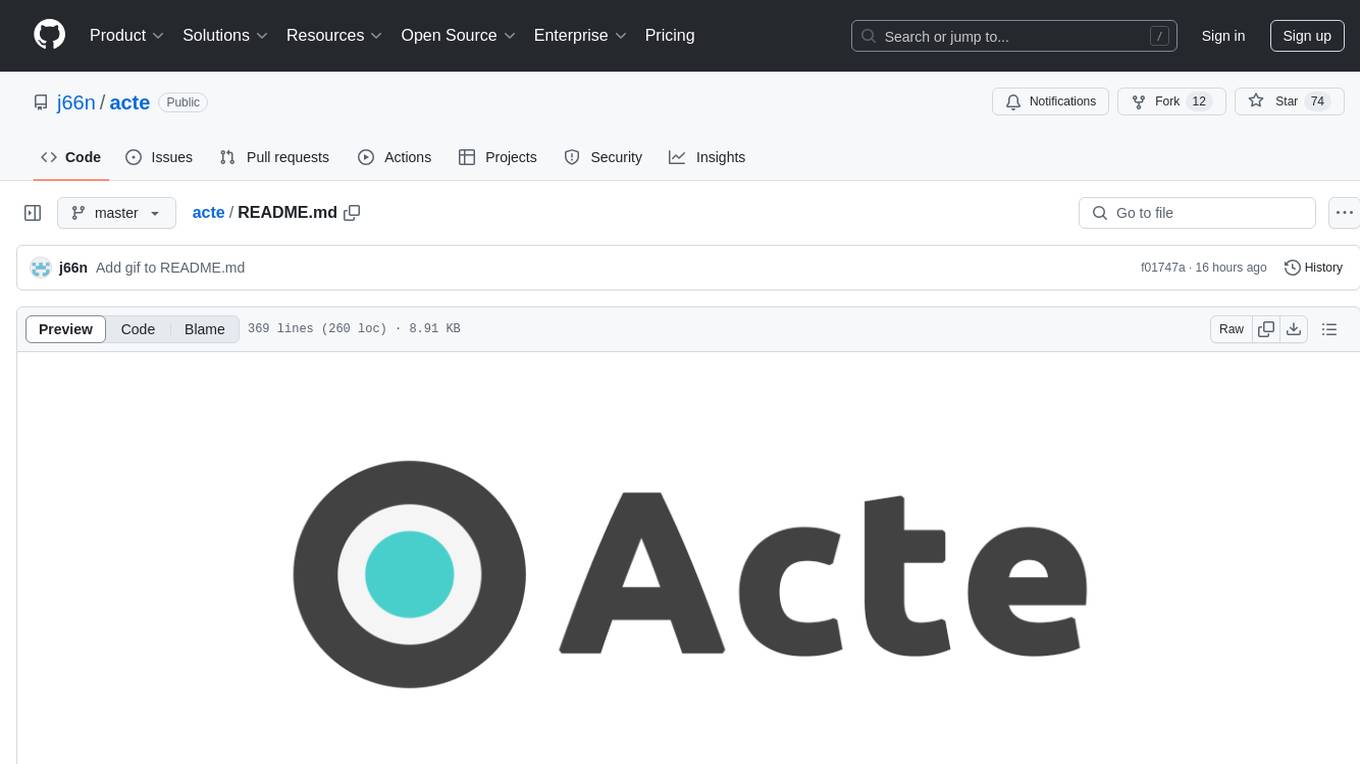
acte
Acte is a framework designed to build GUI-like tools for AI Agents. It aims to address the issues of cognitive load and freedom degrees when interacting with multiple APIs in complex scenarios. By providing a graphical user interface (GUI) for Agents, Acte helps reduce cognitive load and constraints interaction, similar to how humans interact with computers through GUIs. The tool offers APIs for starting new sessions, executing actions, and displaying screens, accessible via HTTP requests or the SessionManager class.
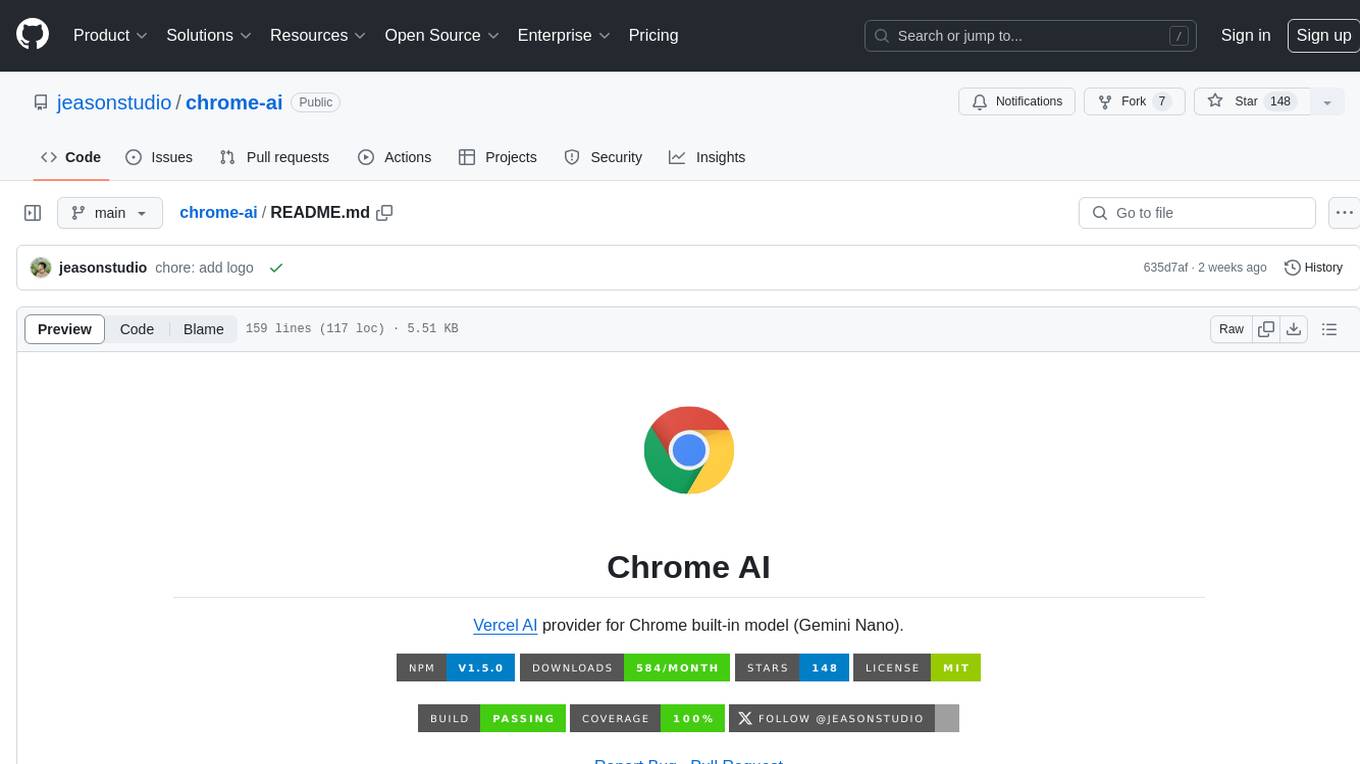
chrome-ai
Chrome AI is a Vercel AI provider for Chrome's built-in model (Gemini Nano). It allows users to create language models using Chrome's AI capabilities. The tool is under development and may contain errors and frequent changes. Users can install the ChromeAI provider module and use it to generate text, stream text, and generate objects. To enable AI in Chrome, users need to have Chrome version 127 or greater and turn on specific flags. The tool is designed for developers and researchers interested in experimenting with Chrome's built-in AI features.
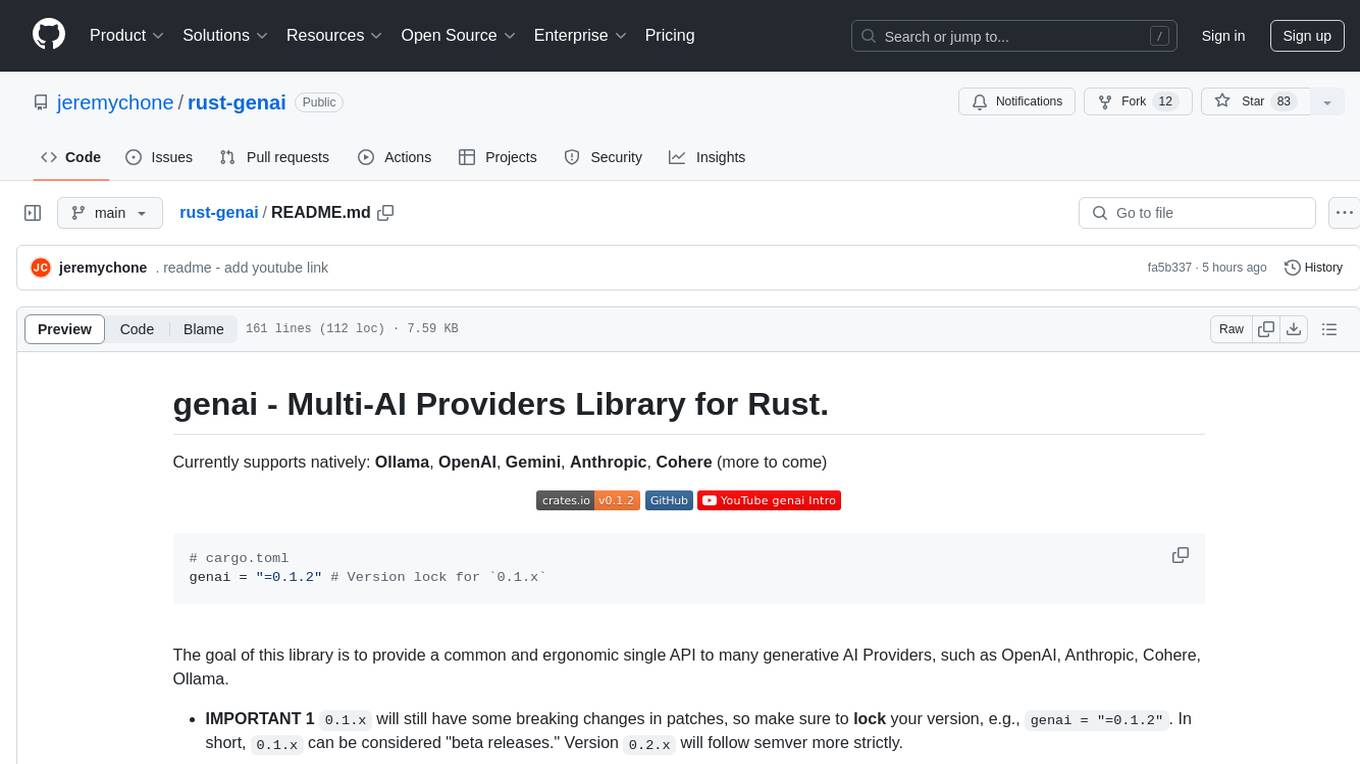
rust-genai
genai is a multi-AI providers library for Rust that aims to provide a common and ergonomic single API to various generative AI providers such as OpenAI, Anthropic, Cohere, Ollama, and Gemini. It focuses on standardizing chat completion APIs across major AI services, prioritizing ergonomics and commonality. The library initially focuses on text chat APIs and plans to expand to support images, function calling, and more in the future versions. Version 0.1.x will have breaking changes in patches, while version 0.2.x will follow semver more strictly. genai does not provide a full representation of a given AI provider but aims to simplify the differences at a lower layer for ease of use.
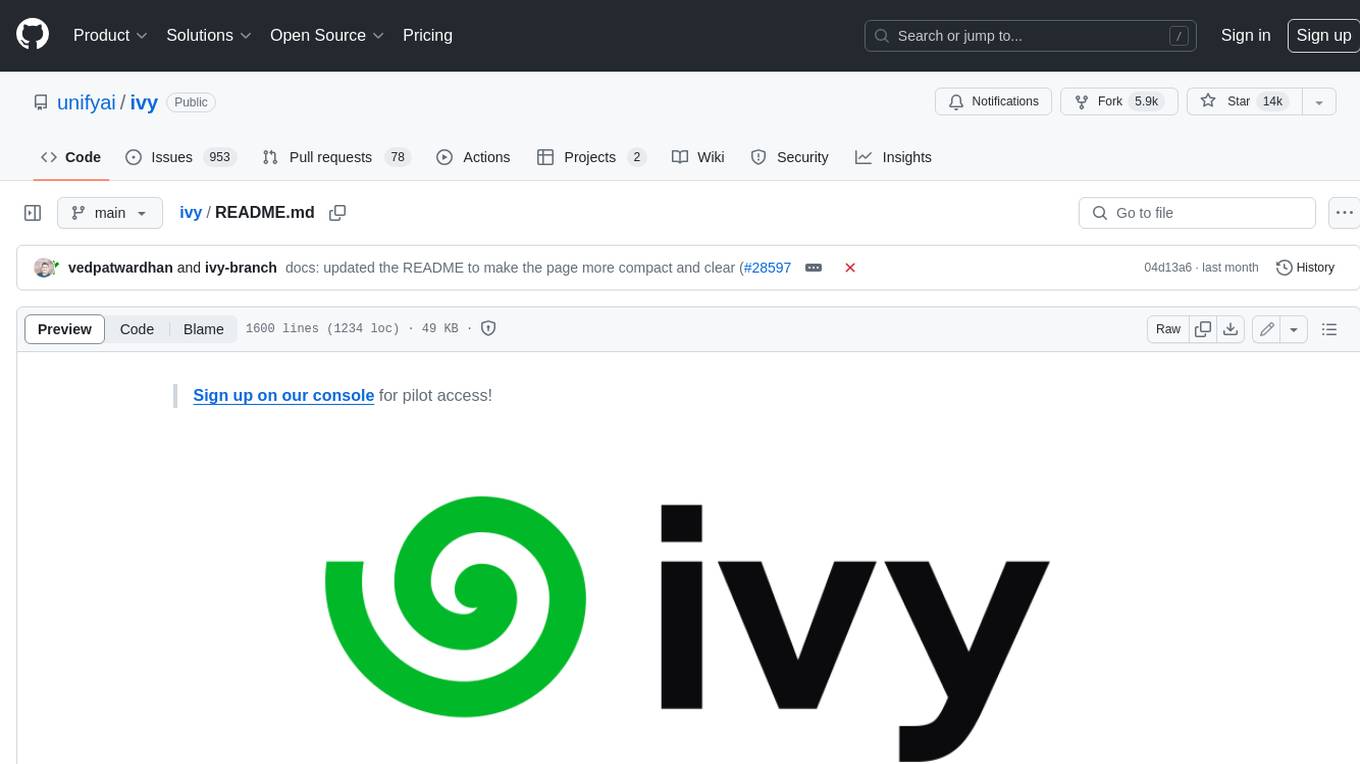
ivy
Ivy is an open-source machine learning framework that enables you to: * 🔄 **Convert code into any framework** : Use and build on top of any model, library, or device by converting any code from one framework to another using `ivy.transpile`. * ⚒️ **Write framework-agnostic code** : Write your code once in `ivy` and then choose the most appropriate ML framework as the backend to leverage all the benefits and tools. Join our growing community 🌍 to connect with people using Ivy. **Let's** unify.ai **together 🦾**
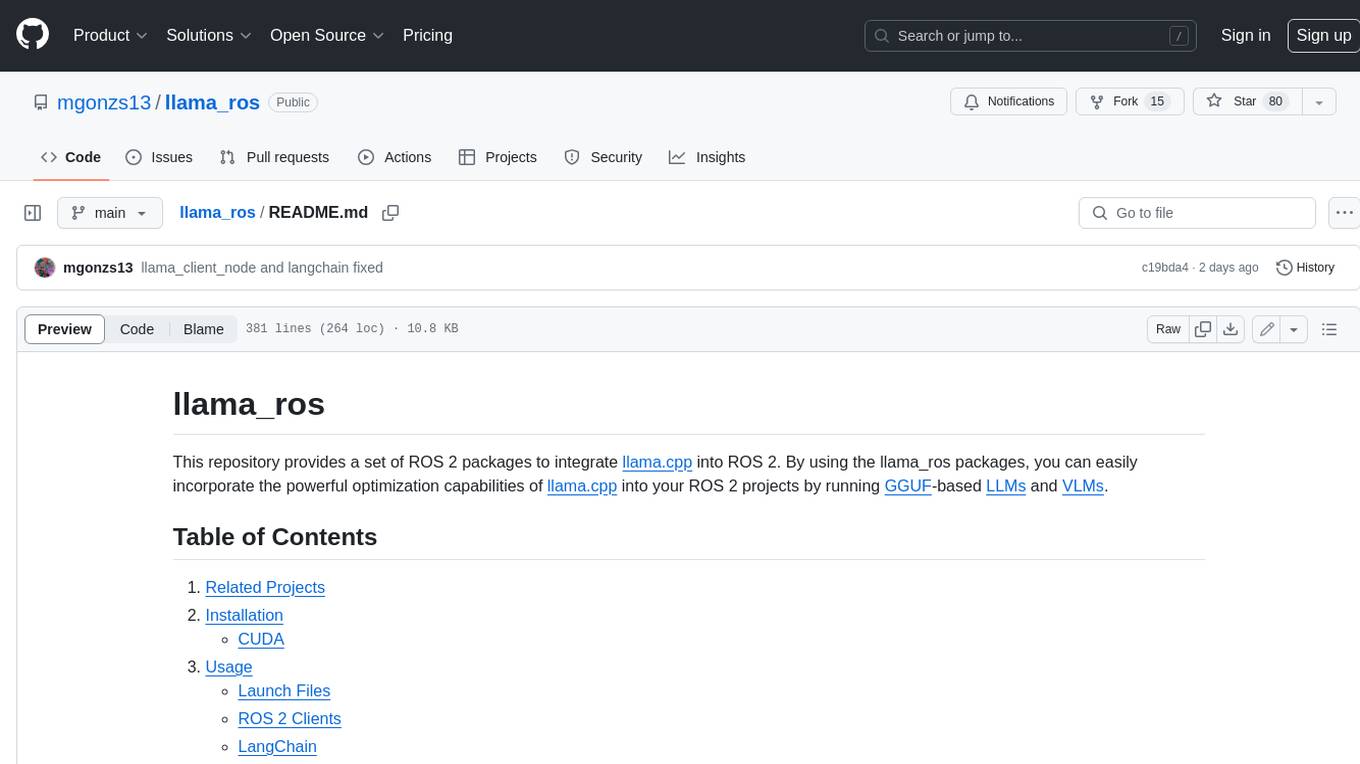
llama_ros
This repository provides a set of ROS 2 packages to integrate llama.cpp into ROS 2. By using the llama_ros packages, you can easily incorporate the powerful optimization capabilities of llama.cpp into your ROS 2 projects by running GGUF-based LLMs and VLMs.
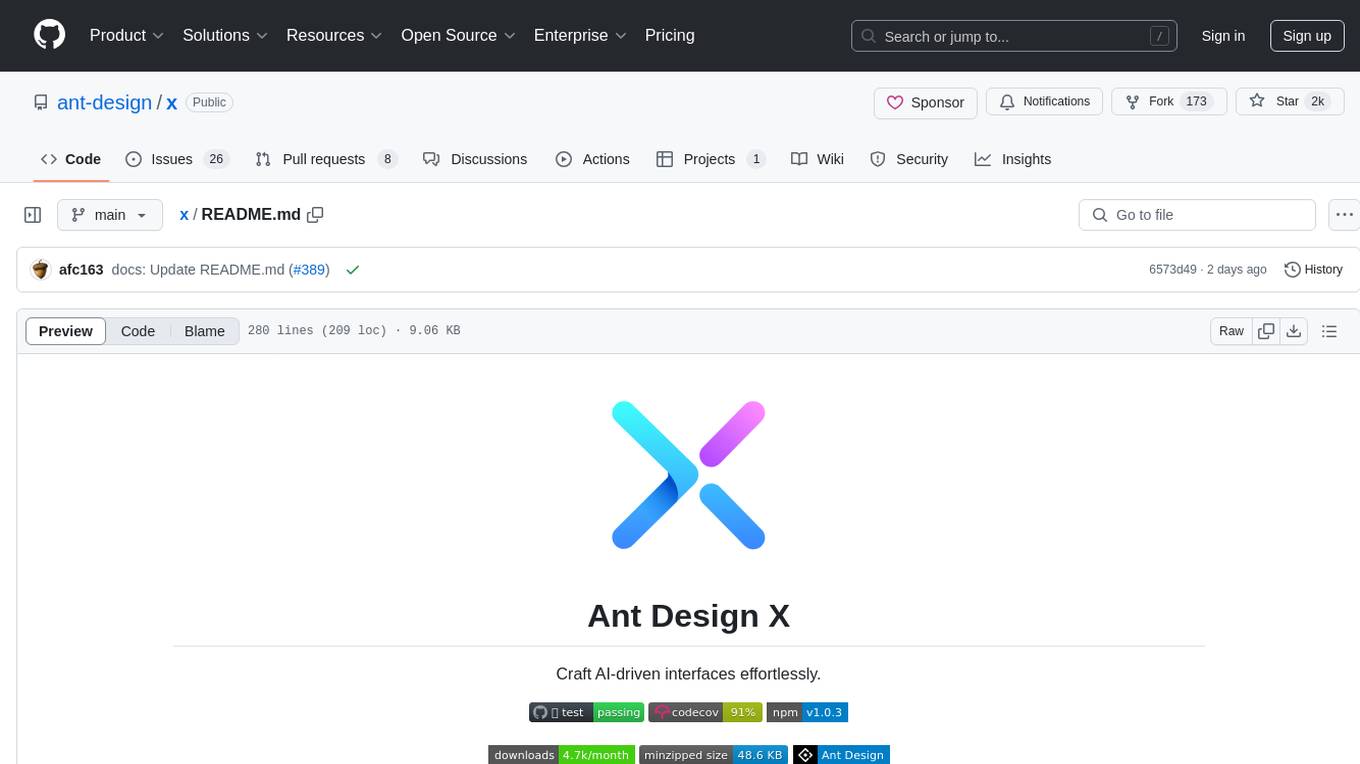
x
Ant Design X is a tool for crafting AI-driven interfaces effortlessly. It is built on the best practices of enterprise-level AI products, offering flexible and diverse atomic components for various AI dialogue scenarios. The tool provides out-of-the-box model integration with inference services compatible with OpenAI standards. It also enables efficient management of conversation data flows, supports rich template options, complete TypeScript support, and advanced theme customization. Ant Design X is designed to enhance development efficiency and deliver exceptional AI interaction experiences.

lagent
Lagent is a lightweight open-source framework that allows users to efficiently build large language model(LLM)-based agents. It also provides some typical tools to augment LLM. The overview of our framework is shown below:
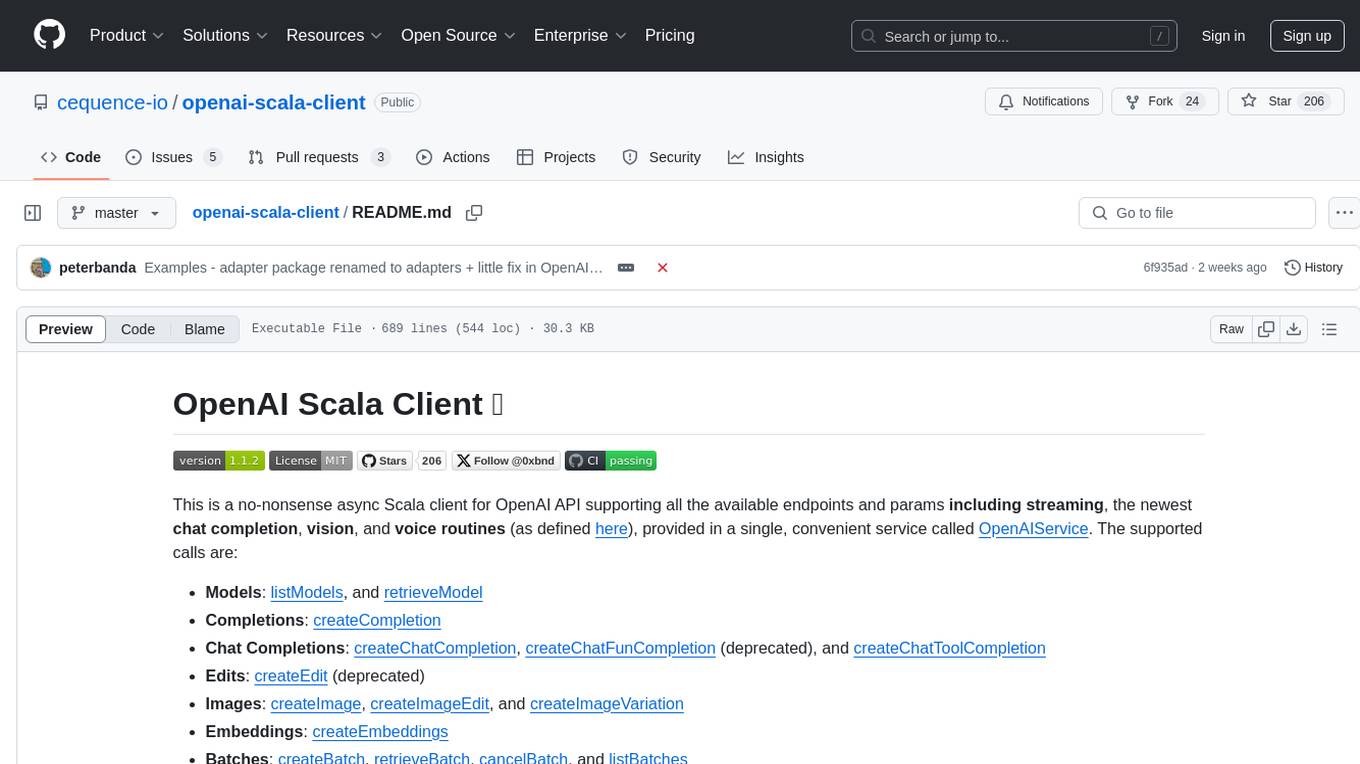
openai-scala-client
This is a no-nonsense async Scala client for OpenAI API supporting all the available endpoints and params including streaming, chat completion, vision, and voice routines. It provides a single service called OpenAIService that supports various calls such as Models, Completions, Chat Completions, Edits, Images, Embeddings, Batches, Audio, Files, Fine-tunes, Moderations, Assistants, Threads, Thread Messages, Runs, Run Steps, Vector Stores, Vector Store Files, and Vector Store File Batches. The library aims to be self-contained with minimal dependencies and supports API-compatible providers like Azure OpenAI, Azure AI, Anthropic, Google Vertex AI, Groq, Grok, Fireworks AI, OctoAI, TogetherAI, Cerebras, Mistral, Deepseek, Ollama, FastChat, and more.
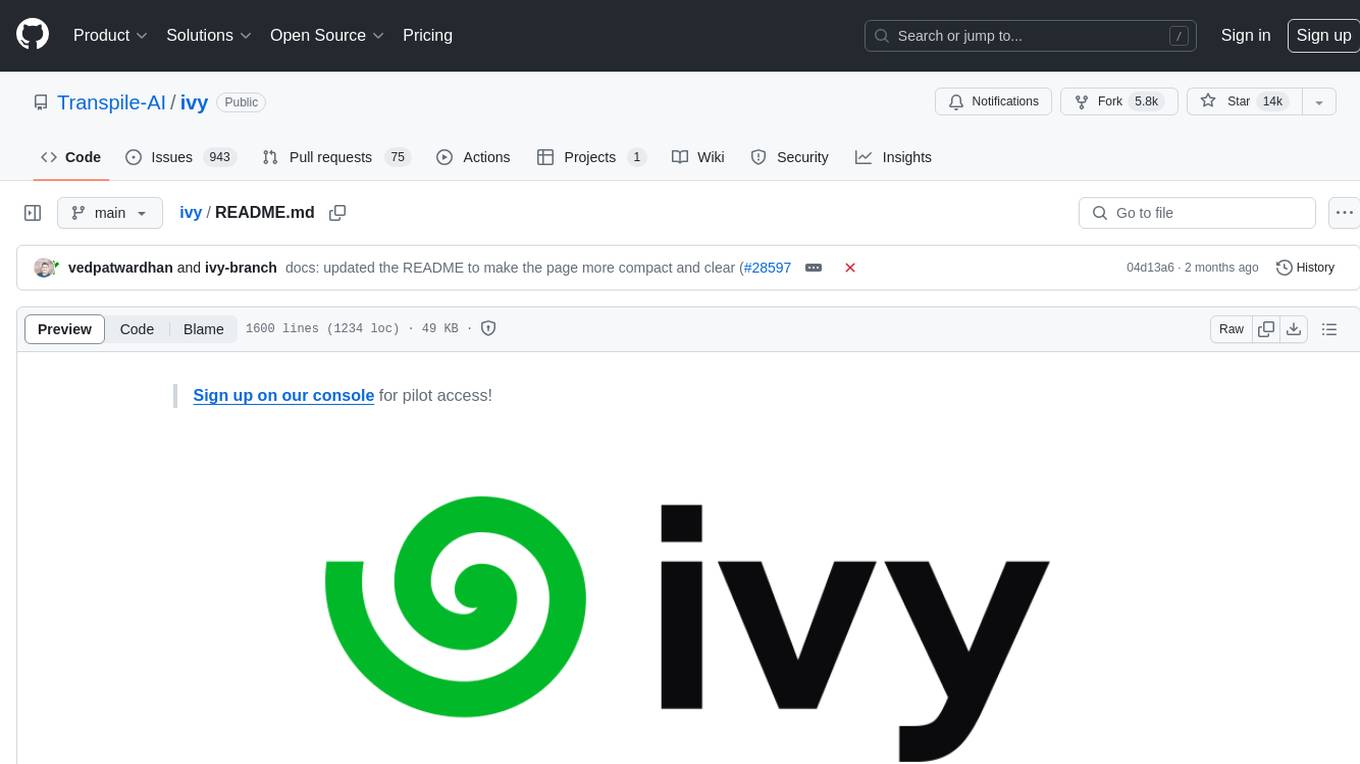
ivy
Ivy is an open-source machine learning framework that enables users to convert code between different ML frameworks and write framework-agnostic code. It allows users to transpile code from one framework to another, making it easy to use building blocks from different frameworks in a single project. Ivy also serves as a flexible framework that breaks free from framework limitations, allowing users to publish code that is interoperable with various frameworks and future frameworks. Users can define trainable modules and layers using Ivy's stateful API, making it easy to build and train models across different backends.
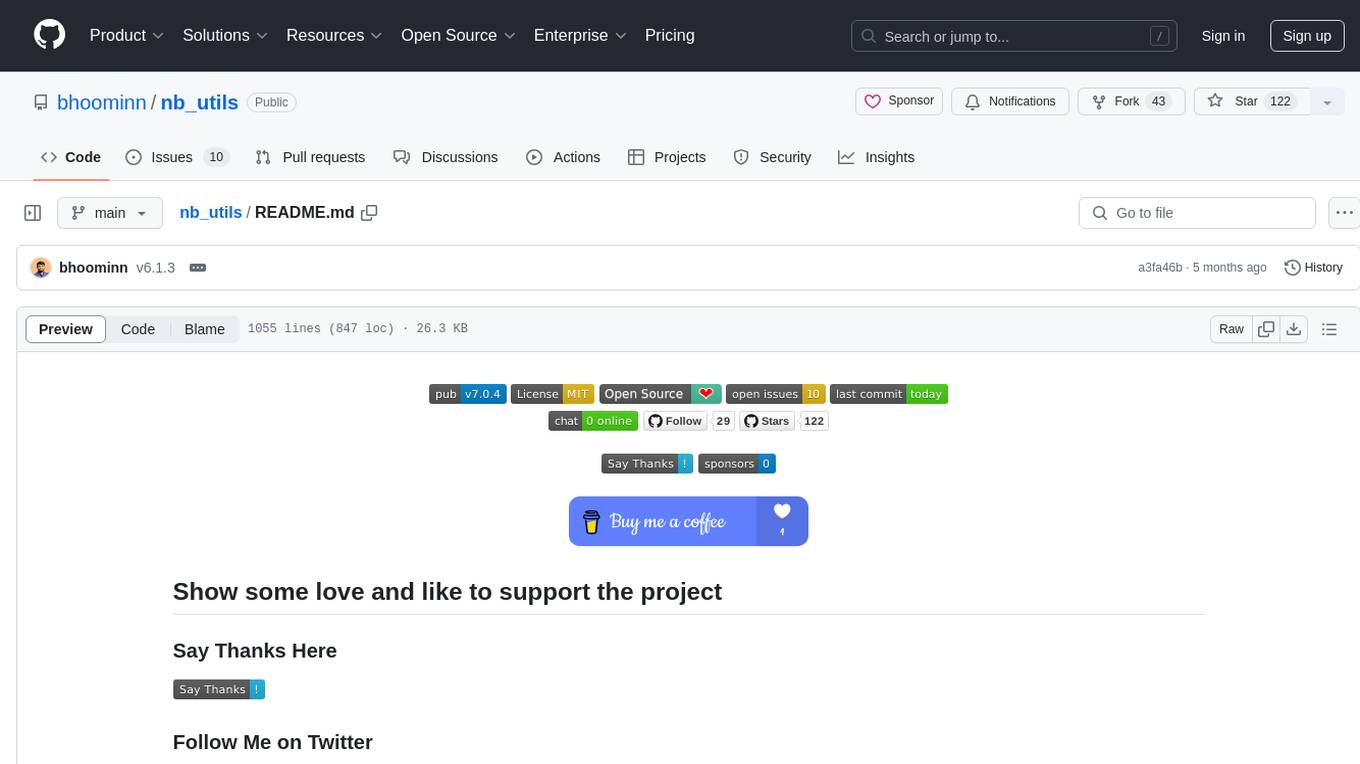
nb_utils
nb_utils is a Flutter package that provides a collection of useful methods, extensions, widgets, and utilities to simplify Flutter app development. It includes features like shared preferences, text styles, decorations, widgets, extensions for strings, colors, build context, date time, device, numbers, lists, scroll controllers, system methods, network utils, JWT decoding, and custom dialogs. The package aims to enhance productivity and streamline common tasks in Flutter development.
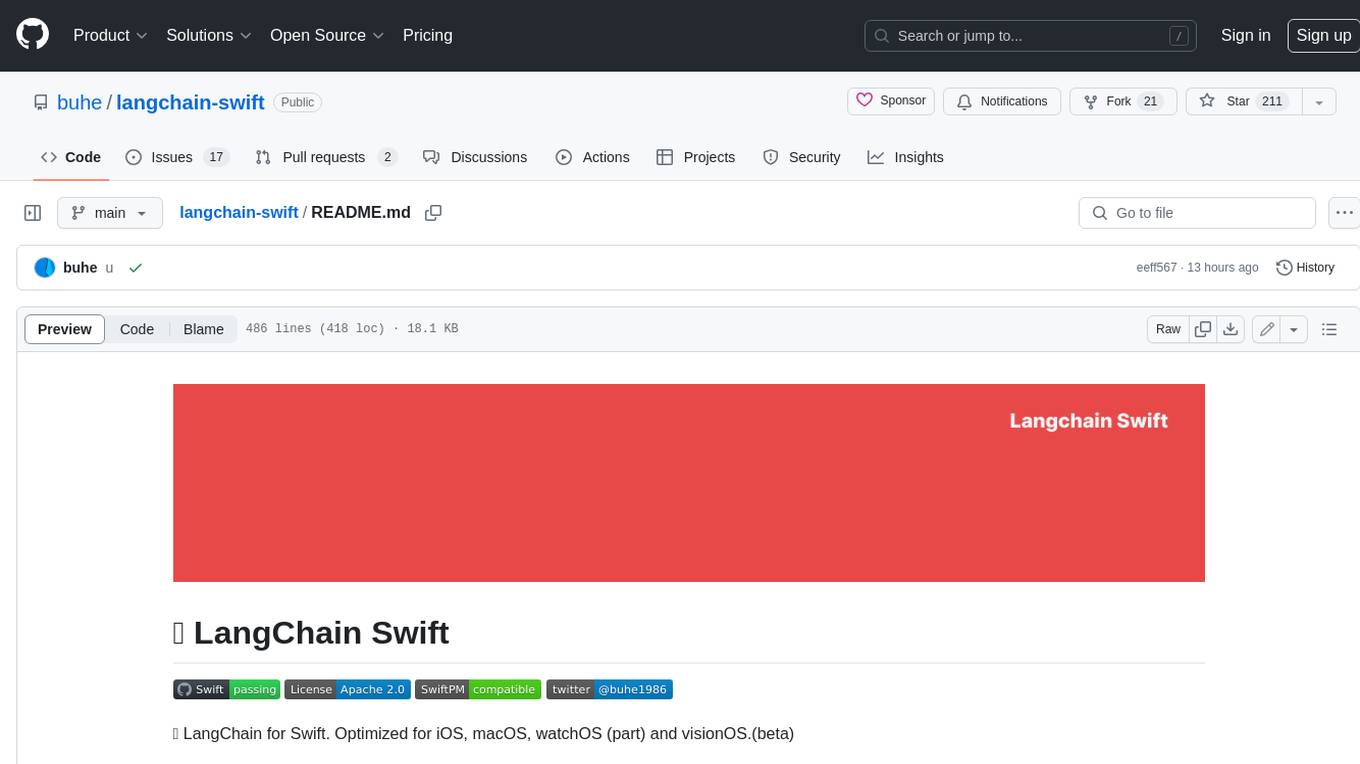
langchain-swift
LangChain for Swift. Optimized for iOS, macOS, watchOS (part) and visionOS.(beta) This is a pure client library, no server required
For similar tasks

agentcloud
AgentCloud is an open-source platform that enables companies to build and deploy private LLM chat apps, empowering teams to securely interact with their data. It comprises three main components: Agent Backend, Webapp, and Vector Proxy. To run this project locally, clone the repository, install Docker, and start the services. The project is licensed under the GNU Affero General Public License, version 3 only. Contributions and feedback are welcome from the community.

zep-python
Zep is an open-source platform for building and deploying large language model (LLM) applications. It provides a suite of tools and services that make it easy to integrate LLMs into your applications, including chat history memory, embedding, vector search, and data enrichment. Zep is designed to be scalable, reliable, and easy to use, making it a great choice for developers who want to build LLM-powered applications quickly and easily.

lollms
LoLLMs Server is a text generation server based on large language models. It provides a Flask-based API for generating text using various pre-trained language models. This server is designed to be easy to install and use, allowing developers to integrate powerful text generation capabilities into their applications.
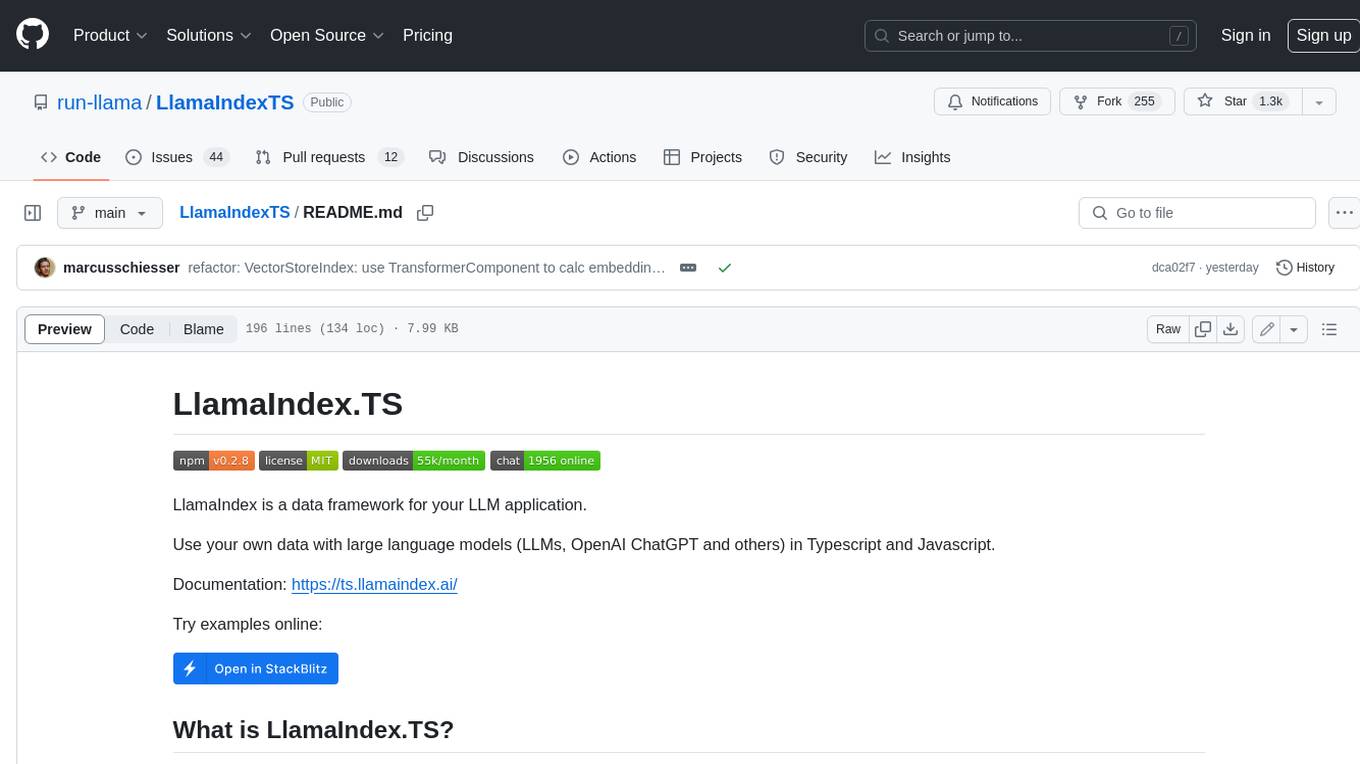
LlamaIndexTS
LlamaIndex.TS is a data framework for your LLM application. Use your own data with large language models (LLMs, OpenAI ChatGPT and others) in Typescript and Javascript.

semantic-kernel
Semantic Kernel is an SDK that integrates Large Language Models (LLMs) like OpenAI, Azure OpenAI, and Hugging Face with conventional programming languages like C#, Python, and Java. Semantic Kernel achieves this by allowing you to define plugins that can be chained together in just a few lines of code. What makes Semantic Kernel _special_ , however, is its ability to _automatically_ orchestrate plugins with AI. With Semantic Kernel planners, you can ask an LLM to generate a plan that achieves a user's unique goal. Afterwards, Semantic Kernel will execute the plan for the user.

botpress
Botpress is a platform for building next-generation chatbots and assistants powered by OpenAI. It provides a range of tools and integrations to help developers quickly and easily create and deploy chatbots for various use cases.
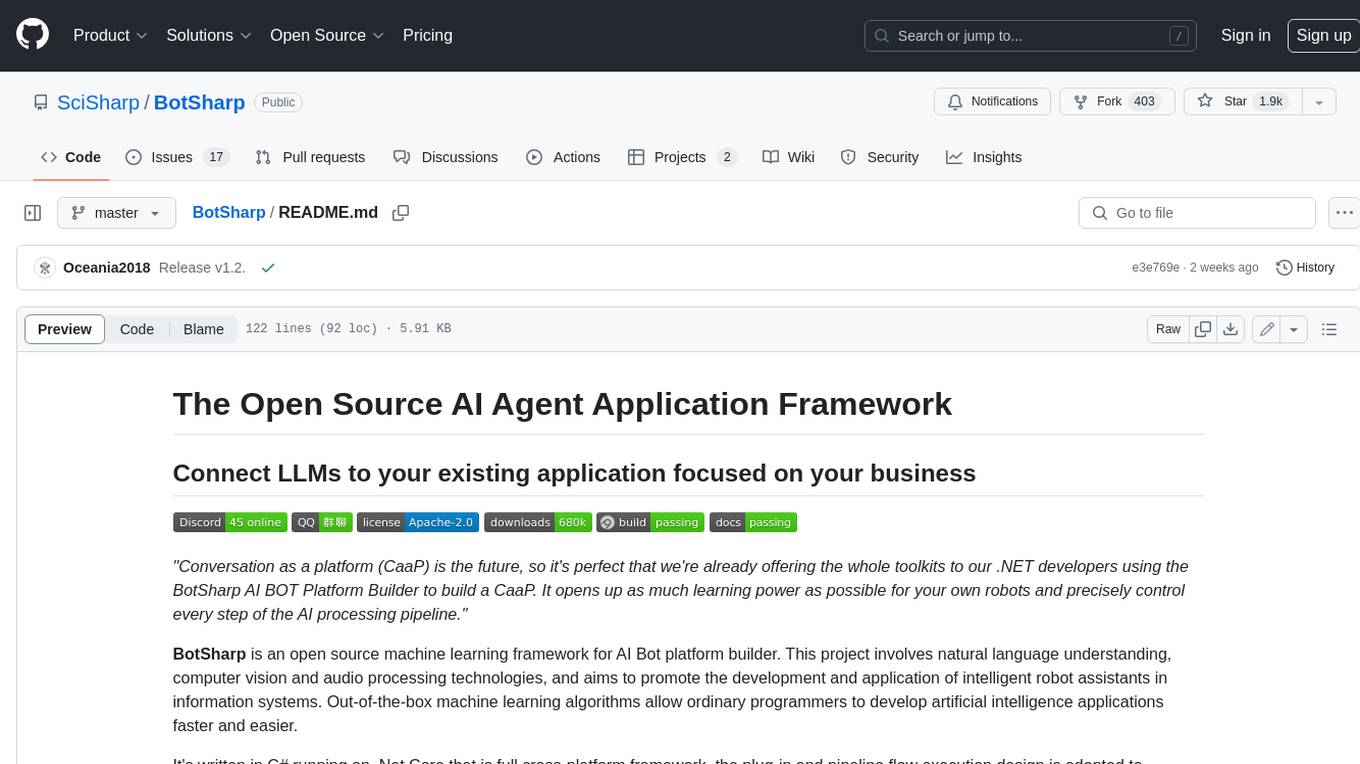
BotSharp
BotSharp is an open-source machine learning framework for building AI bot platforms. It provides a comprehensive set of tools and components for developing and deploying intelligent virtual assistants. BotSharp is designed to be modular and extensible, allowing developers to easily integrate it with their existing systems and applications. With BotSharp, you can quickly and easily create AI-powered chatbots, virtual assistants, and other conversational AI applications.

qdrant
Qdrant is a vector similarity search engine and vector database. It is written in Rust, which makes it fast and reliable even under high load. Qdrant can be used for a variety of applications, including: * Semantic search * Image search * Product recommendations * Chatbots * Anomaly detection Qdrant offers a variety of features, including: * Payload storage and filtering * Hybrid search with sparse vectors * Vector quantization and on-disk storage * Distributed deployment * Highlighted features such as query planning, payload indexes, SIMD hardware acceleration, async I/O, and write-ahead logging Qdrant is available as a fully managed cloud service or as an open-source software that can be deployed on-premises.
For similar jobs

ChatFAQ
ChatFAQ is an open-source comprehensive platform for creating a wide variety of chatbots: generic ones, business-trained, or even capable of redirecting requests to human operators. It includes a specialized NLP/NLG engine based on a RAG architecture and customized chat widgets, ensuring a tailored experience for users and avoiding vendor lock-in.

agentcloud
AgentCloud is an open-source platform that enables companies to build and deploy private LLM chat apps, empowering teams to securely interact with their data. It comprises three main components: Agent Backend, Webapp, and Vector Proxy. To run this project locally, clone the repository, install Docker, and start the services. The project is licensed under the GNU Affero General Public License, version 3 only. Contributions and feedback are welcome from the community.

anything-llm
AnythingLLM is a full-stack application that enables you to turn any document, resource, or piece of content into context that any LLM can use as references during chatting. This application allows you to pick and choose which LLM or Vector Database you want to use as well as supporting multi-user management and permissions.

ai-guide
This guide is dedicated to Large Language Models (LLMs) that you can run on your home computer. It assumes your PC is a lower-end, non-gaming setup.

Magick
Magick is a groundbreaking visual AIDE (Artificial Intelligence Development Environment) for no-code data pipelines and multimodal agents. Magick can connect to other services and comes with nodes and templates well-suited for intelligent agents, chatbots, complex reasoning systems and realistic characters.

glide
Glide is a cloud-native LLM gateway that provides a unified REST API for accessing various large language models (LLMs) from different providers. It handles LLMOps tasks such as model failover, caching, key management, and more, making it easy to integrate LLMs into applications. Glide supports popular LLM providers like OpenAI, Anthropic, Azure OpenAI, AWS Bedrock (Titan), Cohere, Google Gemini, OctoML, and Ollama. It offers high availability, performance, and observability, and provides SDKs for Python and NodeJS to simplify integration.

chatbot-ui
Chatbot UI is an open-source AI chat app that allows users to create and deploy their own AI chatbots. It is easy to use and can be customized to fit any need. Chatbot UI is perfect for businesses, developers, and anyone who wants to create a chatbot.

onnxruntime-genai
ONNX Runtime Generative AI is a library that provides the generative AI loop for ONNX models, including inference with ONNX Runtime, logits processing, search and sampling, and KV cache management. Users can call a high level `generate()` method, or run each iteration of the model in a loop. It supports greedy/beam search and TopP, TopK sampling to generate token sequences, has built in logits processing like repetition penalties, and allows for easy custom scoring.


